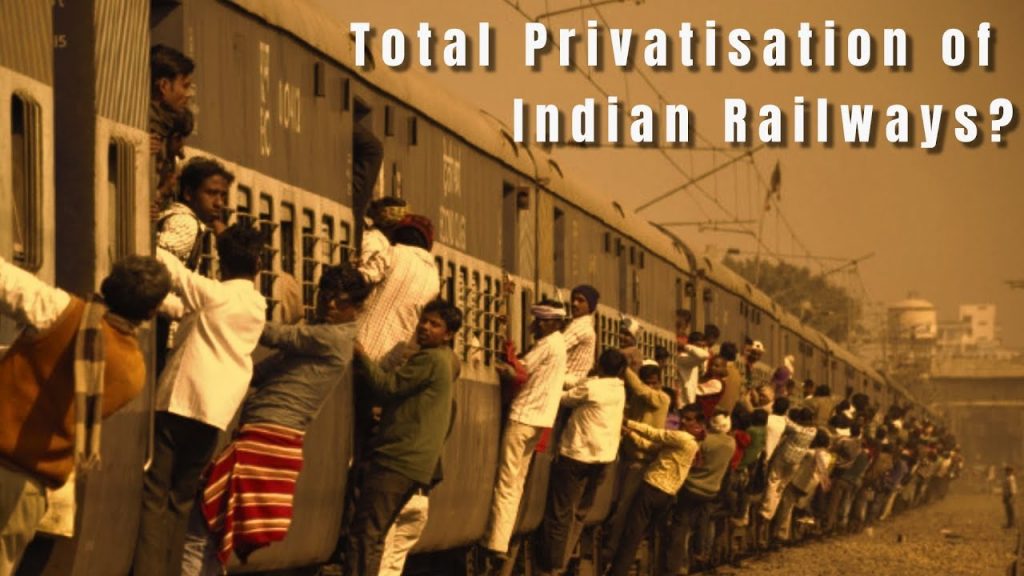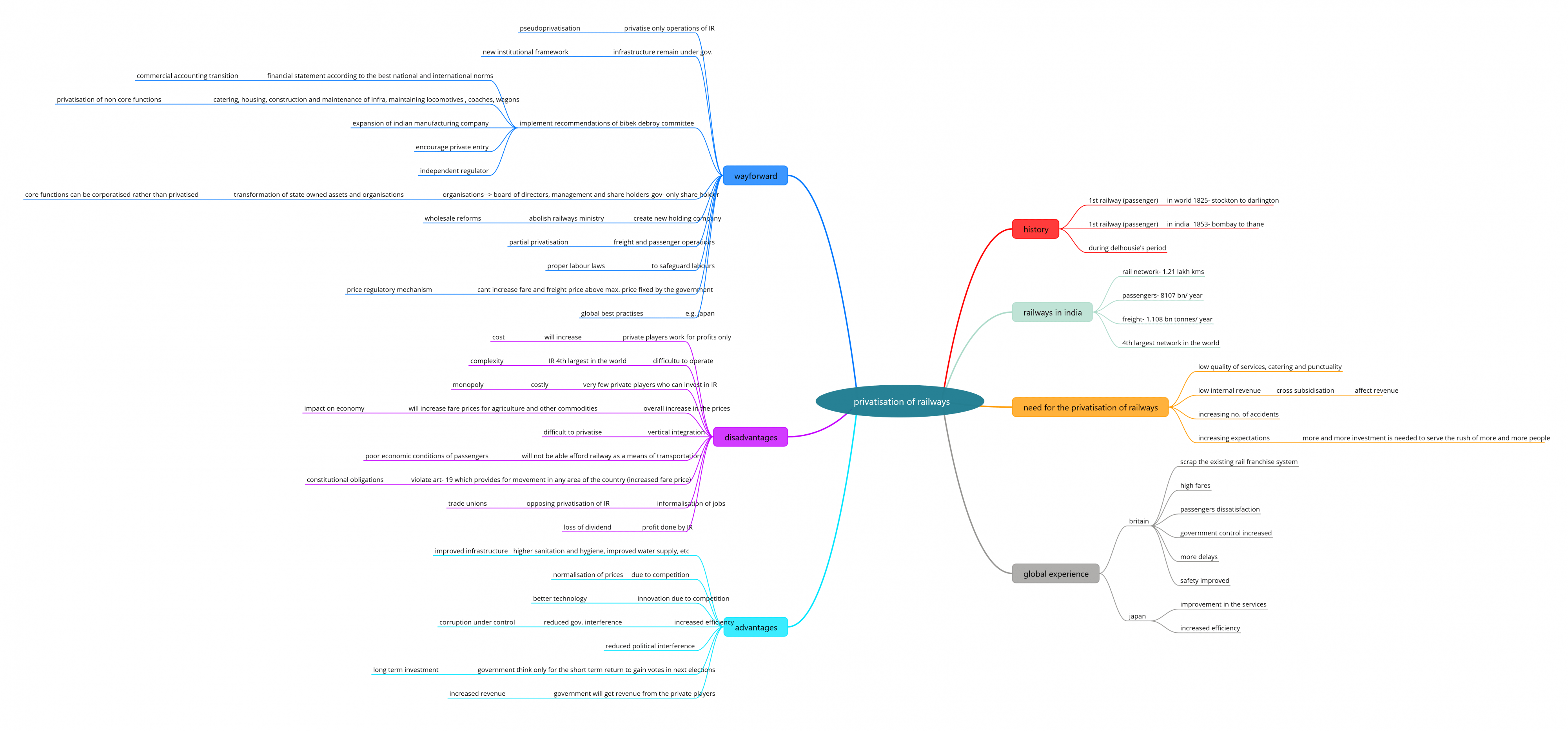Privitization of Railways – Advantages & Disadvantages

Recently, Government of India privatized the Tejas express running from Ahmedabad to Mumbai, which is operated by the IRCTC, arm of the Indian railways. Indian Railways has launched itself on the road to privatisation by flagging off the Tejas Express running between Lucknow and Delhi and announcing plans to privatise the running of as many as 150 passenger trains. Privatisation of railways has benefits like improved efficiency, services, operations, etc. At the same time, it has disadvantages like it can’t provide affordable services, informalisation of jobs, revenue loss to the government in the form of a dividend, etc.
This topic of “Privitization of Railways – Advantages & Disadvantages” is important from the perspective of the UPSC IAS Examination, which falls under General Studies Portion.
HISTORY AND FACTS
- 1st public railway in the world was started in 1825 between Stockton and Darlington.
- 1st public railway in India was started in 1853 between Bombay and Thane.
- Indian railway is the fourth largest railway network in the world.
- Railway network in India comprises of 1.21 lakh kilometers of track.
- It transports 8107 billion passengers and 1.108 billion tons of freight annually.
WHAT IS THE NEED FOR THE PRIVATISATION OF INDIAN RAILWAYS?
- Low quality of service, catering and punctuality- Indian Railway deserves the credit for maintaining the railway network of largest democracy but it faces criticism in services, punctuality and catering
- Low internal revenue- due to cross subsidization revenue has not been generated at the optimum level
- Cross subsidization- money earned through freight traffic is diverted to meet the shortfall in passenger traffic revenue
- Increasing no. Of accidents– increased no. Of accidents of railways have raised the question on efficiency and efficacy of maintaining railways by the government
- Increasing expectations– The Indian Railways network is growing continuously and more investment is required for providing the new rakes of new trains, in order to meet the increasing rush of passengers
WHAT ARE THE GLOBAL EXPERIENCES?
- British
- In a recent legislative agenda of Britain queen introduced to scrap the existing rail franchise system and replace it with the new one based on performance and reliability
- it has not worked as fares are higher, there are more delays, the franchising system is floundering and passenger dissatisfaction is high.
- Safety on British railways has improved after privatisation
- expectations of cost-cutting under private operation did not materialise.
- Government control has increased
- Japan
- they are able to bear the cost of upkeep and improvement in services.
- splitting the legacy railways on the basis of geographical area, not functions like tracks and trains.
- This has helped get around the difficulty of breaking up a highly integrated operation like the railways.
WHAT ARE THE ADVANTAGES OF PRIVATISING INDIAN RAILWAYS?
- Improved infrastructure– privatization of IR will result in improved sanitation and hygiene in the washroom, availability of clean and drinking water all the time, etc.
- Normalisation of price- advent of private players in IR will result in increased competition and it will lead to a reduction in fare prices and improvement in other facilities to attract more passengers. E.g. just like increased competition in the telecom sector
- Improved security– privatization of IR will result in better accountability and responsibility which will result in lesser accidents among railway wagons and will result in better security of individuals
- Better technology– increased competition will incentivise private players to innovate new things which will result in better convenience and better performance of Indian Railways
- Corruption under control:- it will help control corruption in the sector which will eventually increase productivity and thus improve the profits. This can also ensure control of the prize hike and keeping the rail fares under check.
- Political interference– The government may be reluctant to get rid of the workers because of the negative publicity involved in job losses. Therefore, state-owned enterprises often employ too many workers increasing inefficiency. Privatisation will result in increased efficiency
- Short term view– A government many think only in terms of the next election. Therefore, they may be unwilling to invest in infrastructure improvements which will benefit the firm in the long term because they are more concerned about projects that give a benefit before the election.
- Revenue- Selling state-owned assets to the private sector raised significant sums for the UK government in the 1980s.
WHAT ARE THE DISADVANTAGES OF PRIVATISING INDIAN RAILWAYS?
- Increased fare– private players do business only to gain profit, which will result in increased fare prices of transportation through railways. It will defeat the very purpose of operating railways to provide social service at affordable price to Indian residents
- Complexity- Indian rail network is 4th largest in the world which is very difficult to operate and manage, which is one of the reasons why government is not able to maintain a vast network of railways efficiently.
- Monopoly- it is very costly to maintain the railways, so very few private players will be able to bid for maintaining the IR. It may lead to the monopoly in the system, which will affect the services, fare and other facilities
- Impact on economy- high fare prices in transportation of agricultural and other commodities will result in overall increase in the prices of life-sustaining commodities which will have impact on the economy of the country
- Difficult to privatise railway operations– IR is vertically integrated means ownership, maintenance and associated infrastructure all are vested with the ministry of railways only.
- Economic condition of passengers– overwhelming majority of the railway passengers today belongs to the poor and low income sections.
- Constitutional obligations– Providing cheap and affordable travel is the Constitutional responsibility of the government. It will violate article 19 which provides for the movement in any area of the country, increased fare prices will affect this fundamental right
- Trade unions– they have suggested the government not to privatise Indian railways as it will affect the livelihood of many people. Privatisation will lead to informalisation of jobs which will increase vulnerability of workers in the railways
- Dividend- the government will lose out on future dividends from the profit done by government-owned railways
WHAT IS THE WAY FORWARD?
- Pseudoprivatisation- only operations of railways should be transferred to the private players and infrastructure should be with the government only
- Bibek Debroy Committee recommendations
- Commercial accounting transition– financial state of Indian railways need to be redrawn and it should be consistent with best nationally and internationally adopted norms
- Privatisation of non-core functions– like catering, housing, construction and maintenance of infrastructure, maintaining the locomotives, coaches, wagon and their parts
- Encouraging private entry– private entry in both freight and passenger trains should be allowed
- Independent regulator– shift regulatory responsibility from government to the private players, which will improve efficiency and regularity of IR
- Wholesale reforms– Abolish the railways ministry, and create a holding company for the Railways.
- Partial privatisation– freight and passenger operations can be privatized partially, with track access charges. As and when there are losses private players can be fired
- Proper labour laws– privatisation leads to the informalisation of jobs. To safeguard workers and employees in the privatised railways there must be proper labour laws
- Price regulatory mechanism- government should declare a maximum price beyond which fares should not be increased so that passengers can have travelling at affordable prices. There must be layered prices, according to the type of the coach. Fare prices for commodities like agriculture and other life sustaining commodities can be regularised
- Global best practises– privatisation of railways in japan is a success story. Government can privatise railways on the lines of japanese model with appropriate modifications according to the local needs
To improve efficiency and regularity of the Indian railways privatisation may be considered, but at the same time, the government should ensure that there is a level playing field for all private players so that interests of both private players and customers can be protected.


